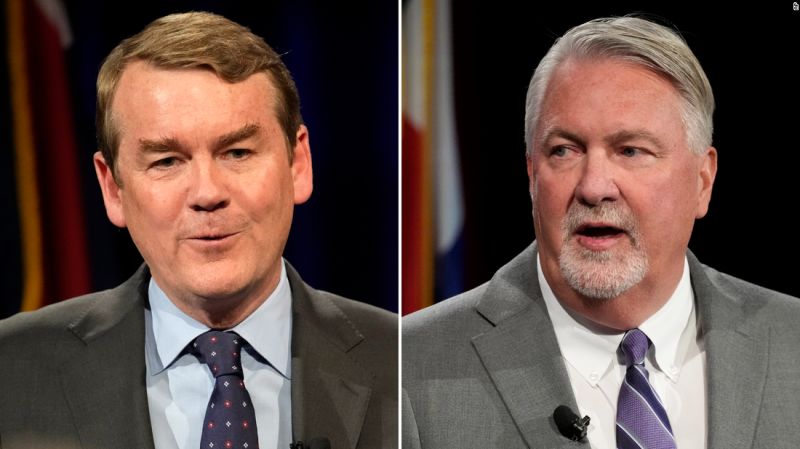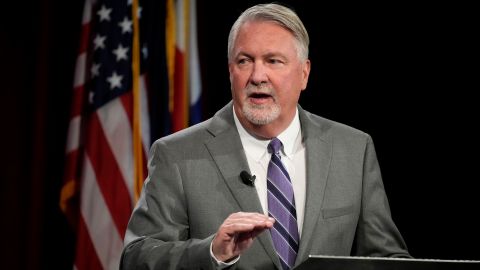
CNN
—
In a year when they are hoping for a red wave, Republicans have set their sights on defeating Colorado Democratic Sen. Michael Bennet in their quest to gain control of the Senate chamber. On Friday night, Bennet engaged in a fast-paced and testy final debate with moderate GOP rival Joe O’Dea, who has distanced himself from former president Donald Trump as he has blamed Democrats for inflation and an energy policy that “straps working Americans.”
Bennet, a Democrat who unsuccessfully ran for the White House in 2020, is facing a tougher than expected challenge from O’Dea, a construction company CEO and first-time candidate. Inside Elections currently rates the race as “Likely Democratic.”
In a year when many Republican candidates clinched their primaries by showing their fealty to Trump, O’Dea is the rare GOP contender who has been eager to flex his independence from the former president.
Things got heated during the Friday night matchup at Colorado State University in Fort Collins as both Bennet and O’Dea sought to win over undecided independent voters in their state, which President Joe Biden won by 13 percentage points. At one point, Bennet repeatedly blasted O’Dea for what said were inaccuracies about the number of bills he has passed: “You’re a liar Joe,” he said. “You’re a liar.” He also sought to cast O’Dea as an opportunist who would make policy decisions to curry favor with wealthy Americans.
But O’Dea said in his closing argument that the election “is a referendum on Joe Biden and his economy.”
Here are seven takeaways from their matchup:
Biden’s approval ratings have been a drag on many Democratic candidates and Bennet came prepared with examples of areas where he would distance himself from the president.
Bennet, for example, said he disagreed with Biden’s approach to student loan debt forgiveness, saying the president should have been more targeted with effort to forgive up to $20,000 in student loans for those earning less than $125,000 per year.
“I don’t think he should’ve done it the way he did it,” Bennet said. “It wasn’t nearly what I thought they should do, which is do it for the people that need it the most – the poorest people in our country that have that debt. … I just think it’s wrong for them to do it that way,” Bennet said.
Even though O’Dea has distanced himself from Trump, Bennet repeatedly sought to remind the audience that O’Dea voted for the former president.
As he touted his own record pushing for a bipartisan compromise to address the country’s immigration issues as part of the “Gang of 8,” he pivoted to an attack on O’Dea for voting for Trump in 2016 and 2020.
“I didn’t vote for a president who made it impossible for us to get anything done on immigration,” Bennet said. “Joe O’Dea voted for that president twice.”
O’Dea rebuffed that jab: “A lot of talking. We are hearing a lot of talking. You have been talking for 13 years and you haven’t got it done. Michael Bennet doesn’t deliver results. What he does is vote with Joe Biden 98% of the time,” O’Dea said. “And the result is an economy that’s trash.”

The moderator, at one point, asked O’Dea – who recently told CNN’s Dana Bash that he would “actively” oppose the former president if he ran for the White House in 2024 – whether he stood by his previous statements that he’d still vote for Trump if he’s the 2024 Republican nominee.
“I said what I said,” O’Dea replied. “I’m a contractor, not a politician.”
Bennet didn’t let that opportunity slip away. He noted that O’Dea voted for Trump “after children were separated from their parents at the border” and after the former president said there were “good people” on both sides after violence erupted at a gathering of White supremacists in Charlottesville, Virginia.
“What changed?” Bennet directly asked O’Dea, that would lead him to say that he would still support Trump in 2024 after all his criticism of the former president.
“Well, I started thinking about Joe Biden serving another four years and you serving another six years and I gotta tell you, it’s terrifying,” O’Dea said. “Working Americans here, need a voice. I’ll be the voice of reason that says, ‘You know what, we need to be disciplined. We need to do what’s right for Colorado instead of just hanging with my party 98% of the time.’”
Democrats have struggled to articulate a message that both addresses the economic pain that Americans are feeling while simultaneously touting their own legislative accomplishment, including the health care, tax and climate bill they passed this year known as the “Inflation Reduction Act.” One of the debate moderators noted that despite the name of the act, it “will not, according to the nonpartisan Congressional Budget Office, reduce inflation in any meaningful way.” Did Democrats, the moderator asked Bennet, mislead Americans by calling it that?
Bennet disputed the notion that the American people were misled and tried to break down that legislation into clear, digestible bites, including the savings that Colorado voters might expect from it.
“Unlike the Trump tax cuts – this bill was actually paid for and it would cap drug prices for seniors at $2,000 in Colorado,” he said. “It would require Medicare for the first time in American history to negotiate drug prices on behalf of the American people. And it caps insulin at $35 a month. Joe O’Dea says there’s nothing to like in that bill. I think there are a lot of Coloradans, especially seniors, that are going to find a lot to like in this bill.”
A common attack line from Republicans after the Supreme Court overturned the Roe v. Wade decision is that it is Democrats who are too extreme on abortion – because some progressive candidates have not defined what limits, if any, they would place on the procedure.
Bennet defended his support of legislation that would not put restrictions on abortion in Friday night’s debate.

“Only 1% of the abortions in our state in this country are late term abortions. And they’re the worst circumstances a mother could have,” Bennet said. “These are circumstances where she’s carried the baby to term. She’s picked out a room for the child. She’s named the child. She’s expecting the child to be there and for medically horrific reasons. She’s having to have an abortion. That’s 1%. And I don’t think Joe O’Dea should be in that hospital room with her when she’s got to make that decision. I don’t think any politician should.”
O’Dea, for his part, said he supports “a woman’s right to choose” up to five months. After that time period, the Republican said he supports exceptions for rape, incest and medical emergencies including risk to the life of the mother.
“I can’t vote for late term abortion. I believe women’s health rights are paramount,” O’Dea said. “I would support a woman’s right to choose up to and including five months. … Michael Bennet on the other hand, he has voted for abortion up to, and including the moment of birth, and he wants to use taxpayer funding to pay for it. To me that’s extreme.”
Bennet and O’Dea found some common ground when moderators asked about gun control measures. Both said they support universal background checks, and both said they opposed mandatory 10-day waiting periods to purchase firearms.
But they split on whether to increase the legal age to purchase assault rifles from 18 to 21. Bennet said he would support such a measure; O’Dea said he wants “no more laws” on guns.
“We’ve got plenty of laws on the books,” O’Dea said. “We need to enforce the laws that are on the books now. And I will not be lectured by Democrats that say we need to change this gun law, change that gun law, when they fail to enforce the laws that we already have on the books.”
O’Dea also said he opposes a ban on the sale of assault rifles, which Bennet supports. “I think we’ve made enough of these weapons of war in this country,” Bennet said.
O’Dea said he would not support legislation to create a path to citizenship for those who benefited from the Obama-era Deferred Action for Childhood Arrivals program if the legislation did not include other provisions like funding for border security. The program was intended to help undocumented immigrants who were brought to the United States as children (many of whom are now adults).
